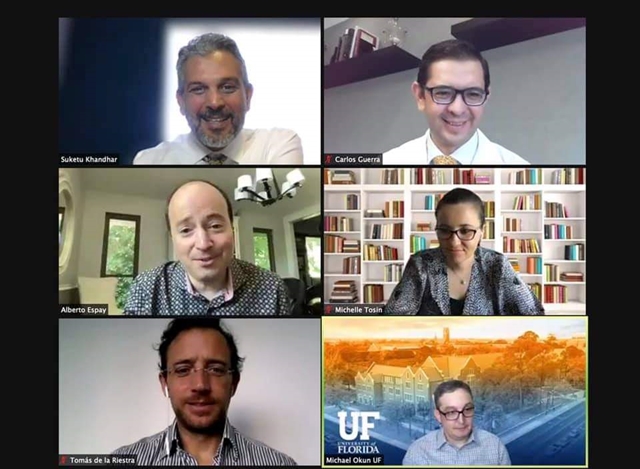 VOLUME 26, ISSUE 1 • March 2022. Full issue »
VOLUME 26, ISSUE 1 • March 2022. Full issue »

MDS-PAS Comprehensive Care in Parkinson’s Disease: An Interactive Course for Leadership and Care
Share this:
We have all heard the adage “it takes a village” when it comes to raising children. That line of thinking can be applied to complicated neurodegenerative diseases like Parkinson’s disease. It is well understood that despite Parkinson’s disease being defined by its motor features, it also causes an array of non-motor symptoms that require expertise outside of the Movement Disorders field. Successful treatment can therefore not be possible by any one provider. A more comprehensive approach to treatment is necessary to better quality of life for the patient and their families.
MDS sponsored and was proud to present The Comprehensive Care for Parkinson’s Disease two-day virtual course on June 4-5, 2021. Its purpose was to provide attendees with practical tools to develop and improve their comprehensive care models in the Americas, enhance leadership skills and establish an optimal communication network with other regional centers to strengthen networks of clinical care and continue education and research. The course helped attendees distinguish between multidisciplinary, interdisciplinary and integrated care and how it can apply to academic centers, group practice and private practice, especially in underserved areas.
Course Directors, Dr. Carlos Guerra (SLP, Mexico) and Dr. Suketu Khandhar (Sacramento, CA), designed this one-of-a-kind course with close guidance of the MDS-PAS Program Manager International Secretariat, Nilda Toro.

We were privileged to include in our faculty leaders and pioneers on the multidisciplinary care for PD across the Americas: Jennifer G. Goldman (Chicago, IL), Alberto Espay (Cincinnati, OH), Michael S. Okun (Gainesville, FL), Michelle H.S. Tosin (Chicago, IL), Tomás de la Riestra (Rosario, Argentina), Erin Vestal (Roseville, CA) who generously shared with our attendees their personal experience, knowledge and recommendations through our sessions and workshops.
What made this program unique was the introduction and utilization of “A3 problem solving thinking”. This business tool, originally leveraged by the Toyota Corporation, focuses on desired goals, identifying gaps that prohibit reaching those goals and ultimately providing structure for the changes that need to be made to achieve the future goal.
What made this program desirable and successful were the small group breakout sessions where participates were encouraged, while using an online version of the A3 problem solving template, to identify their comprehensive care gaps, share best practices and leverage the collective strength of the faculty and participants.
The course included 37 previously selected attendees, based on their professional profile and their pre-course questionnaire answers (movement disorders specialists, neurologists, physical/speech therapists and nurses) from Bolivia, Panama, Brazil, Chile, Peru, Trinidad and Tobago, Argentina, México and USA.
Overall, participants were highly satisfied with the quality of the course and found all educational objectives met, stated that the content was relevant to their practice or research and were eager to continue future communication and collaborative work. Despite different geographical and social backgrounds, we all shared the same passion and interest to improve our care models to help our patients and caregivers access well-organized, goal-directed and permanently-improving comprehensive care models.
Share this: Tweet
Read more Moving Along:






